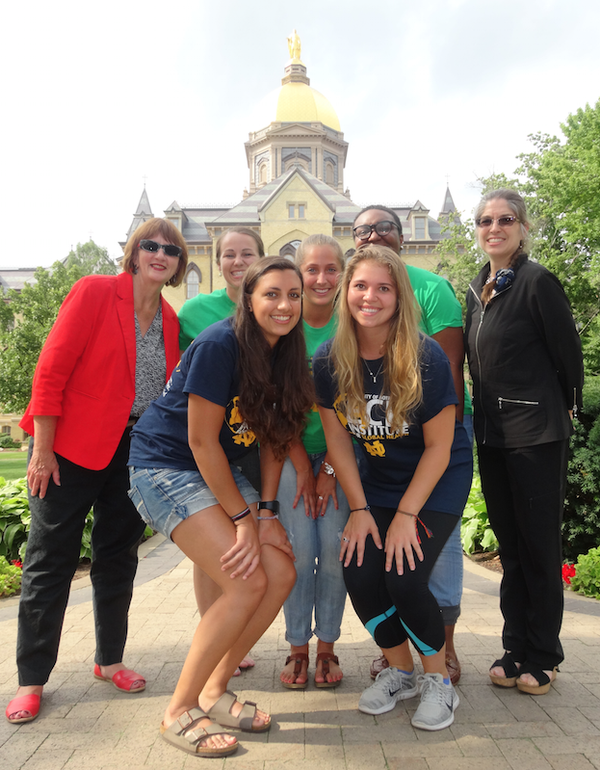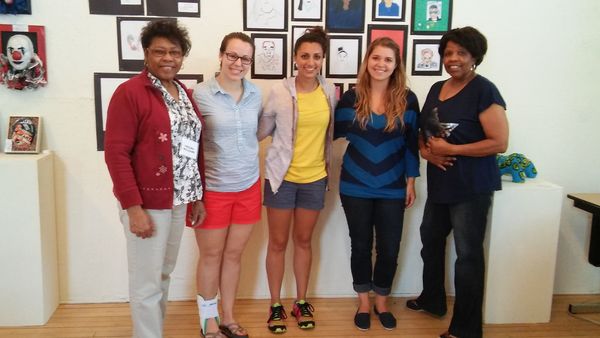
As a former resident of South Bend, Dr. Naomi Penney was familiar with the vast needs and limited resources community members had to address community neighborhood improvement projects. For years she worked Diana Hess, Executive Director of the Neighborhood Resources Connection (NRC), who mentored her through the intricacies of managing a community support system. Penney currently teaches for the University of Notre Dame’s Master of Science in Global Health program at the Eck Institute for Global Health and has unique collegiate resources to work toward solutions, including graduate student researchers. Thus, by putting the two together and working with Hess’s leadership, an answer for South Bend residents was on the horizon.
As an independent, non-profit, self-sustaining organization, the NRC has many challenges. While the services are very much needed, there are limited funding sources for operational support for organizational services such as this. To help address this ongoing problem, the NRC applied for a grant from the Pokagon Band of Potawatomi Indians in support of two neighborhoods: Southeast Organized Area Residents (SOAR) and the Far Northwest. To make the most efficient use of the generous funds, Penney designed a class project for her six Master of Science in Global Health students enrolled in her Advanced Qualitative Methods course. Results were compiled into a written report titled, “A Neighborhood Assessment,” and delivered to each neighborhood through the NRC. The neighbors found the report quite valuable for decision-making and how they look at their neighborhood. They now have an editable version that they can update as data and situations change. Without the students, the NRC would not have been able to provide this detailed analysis to the participating groups.
“The students’ work allowed us to expand our capacity and provide deliverables for the program that NRC could not have at this time,” states Hess. “The neighborhood projects that resulted include neighborhood clean-ups, block party celebrations in two local parks, and scholarships for neighborhood youth.”
The report collected a wide variety of information including, but not limited to, demographics, public transportation, churches, businesses, banks, not-for-profits and resources, schools, sidewalks and crosswalks, trees and parks, abandoned houses and vacant lots, renters and home owners, income information of residents, home sale values, crime statistics, health statistics, and existing community partnerships. Collecting this type of information in one central document is vital when being used for assessment.
“This experience was eye-opening,” states Jalen Carpenter MS ’16. “At first the assignment was just a class project. But once we got into the community and met the people, it became so much more. This is home to many people. Our work here, while temporary, will affect people’s livelihood and lives. So we took our work very seriously and wanted to produce a great, useful product.” Carpenter received her bachelor’s degree in Biological Sciences from Saint Mary’s-of-the-Woods in 2015.
Classmate Brooke Miers MS ’16, agreed. “I’m from South Bend. But, like my classmates, I had to immerse myself in the community and get involved to build a level of trust. Learning about qualitative methods and applying what we learned brought a whole new meaning to my community.” Miers received her bachelor’s degree in Microbiology from Indiana University in 2015.
Working with the City of South Bend, the report provides information to streamline analytical process, discuss the options, and invest in improvements for the neighborhood. While some of the largest challenges include abandoned homes and vacant lots, some suggestions for solutions include increased grocery stores, more transportation lines, and increased green space.

The class is designed to provide students with a working knowledge of study design, questionnaire development, survey research, and a variety of the most commonly used qualitative and participatory research tools for public health practice. Students learn how to design research projects and analyze data using various methods. This particular practical project with the NRC allowed the students to arrive at conclusions that are supported by sound research methodologies. The students produced a usable tool for the community that helped them develop a more discerning approach to constructing qualitative reports in health science. Using the NRC was a practical way for students to apply their skills and immediately see the impact of their work.“The PhotoVoice portion of the project was an important way for community members to give their input and participate,” says class member Cassandra Sundaram MS ‘16. “It also provides a visual and audio record for the future.” PhotoVoice is a participatory research method that makes citizens into researchers, who identify issues and engage in critical dialogue which, ideally, leads to social change. It is designed to allow all people to have a voice, including the disadvantaged and marginalized in the community. “Working in partnership with other charities, NGOs, and community organizations, PhotoVVoice designs and delivers tailor-made participatory photography, digital storytelling, and self-advocacy projects for socially excluded groups.” Sundaram received her bachelor’s degree in Biological Sciences from the University of Minnesota in 2014.
The Neighborhood Resource Connection (NRC) in South Bend is a vital community resource and organizing entity for all residential neighborhood associations throughout the city. Bringing people together to identify and address community challenges and obstacles is at the heart of their mission. Numerous training models are available to engage residents including a Neighborhood Leadership Academy. For more information or to see about how you could get involved in your local South Bend community neighborhood, contact Diana at 574.287.0425 or nrcneighbors@gmail.com
The University of Notre Dame’s Eck Institute for Global Health is a University-wide enterprise that recognizes health as a fundamental human right and endeavors to promote research, training, and service to advance health standards for all people, especially people in low and middle-income countries who are disproportionately impacted by preventable diseases.
Above photo (L to R): Diana Hess, Katherine Merritt, Cassandra Sundaram, Brooke Miers, Alyssa Paul, Jalen Carpenter, Dr. Naomi Penny
Below photo (L to R): Thelma Williams, Katherine Merritt, Cassandra Sundaram, Alyssa Paul and Rose Wilson
Contact: Sarah Craig 574-631-2665 Craig.20@nd.edu